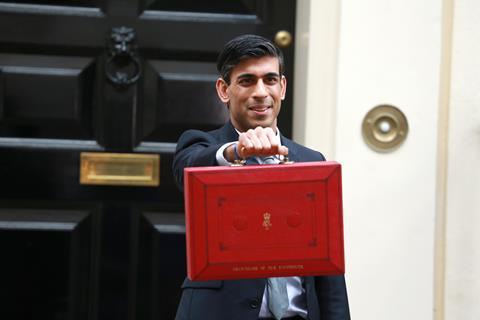Chancellor uses budget to extend tax holiday for some purchases until September
Shares in listed housebuilders have leapt after chancellor Rishi Sunak used today’s Budget to extend the stamp duty holiday on house purchases for three months more than expected.
Sunak had been widely expected to use today’s speech to extend the existing holiday for purchases of up to £500k until the end of June – and he duly delivered. However, he surprised the market by deciding that purchases of up to £250k in value will be exempt all the way through until the end of September.

This further extension, which will apply to around 45% of all house purchases, means that thousands of new sales will be able to be agreed now and still have time to benefit from the approval, stimulating more market activity.
Given current extended lead times on completing house purchases, it was thought that the anticipated three-month extension would largely only benefit buyers who had already agreed purchases.
Within an hour of the chancellor delivering his speech, shares in a number of housebuilders had risen by more than 1% above gains made earlier in the day, with Taylor Wimpey shares climbing by around 2.5% between midday and 2pm.
Online property portal Rightmove said, that within minutes of Sunak sitting down, use of the firm’s online mortgage calculator had jumped by 85% and overall traffic had spiked by 16%.
The surprise stamp duty announcement came as Sunak unveiled a series of measures designed to support businesses through the pandemic, restore public finances and stimulate an economic recovery.
As expected, the chancellor unveiled a mortgage guarantee scheme designed to rebuild the moribund market for the 95% loan-to-value (LTV) mortgages relied upon by many first time buyers. He said the scheme would come in to effect in April and will provide a guarantee to lenders across the UK who offer 95% LTV mortgages on homes with a value of up to £600,000.
He also went further than many expected in setting out plans to raise Corporation Tax. He said the rate of the principle business tax will rise from the current 19% to 25% in 2023 – just 1% below the level promised in the 2019 Labour Party manifesto.
However, he also said he will extend the furlough scheme and equivalent support for the self-employed until September to protect jobs while the pandemic continues.
The announcements came amid a series of other measures likely to impact upon residential development, including more support for apprenticeships, the designation of eight low-tax “Freeports” in different parts of the UK, and £1bn towards 45 new “town deals”, with the North west and Yorkshire and the Humber set to benefit the most.
Treasury documents also revealed the government plans to put £10m into a new MMC Taskforce to drive the adoption of modern methods of construction.
Many in the housebuilding sector welcomed the surprise news on stamp duty, with Russell Gardner, UK & Ireland head of real estate at consultant EY, saying it was a “good news item for the housing market” that would “stimulate demand.”
Iain McKenzie, CEO of The Guild of Property Professionals, described it, alongside the mortgage guarantee, as a “double shot in the arm” for the property market.
However, many expressed scepticism that the measures would do much to help buyers, ultimately simply fuelling house price inflation.
Michael Voges, executive director of later living developer trade body ARCO said: “You can’t help someone buy a house when that house doesn’t exist. Stoking demand through mortgage guarantees and subsidies will not solve our housing crisis and is the equivalent of shovelling yet more cash into the furnace of rising property prices.
The CEO of Enness Global Mortgages, Islay Robinson, said: “95% mortgage products in any shape or form take the market into pretty overheated, dangerous territory and we’ve previously seen the results of this kind of precarious lending to those who aren’t really in the financial position to commit to it.”











No comments yet